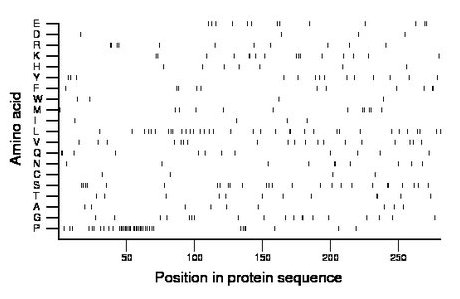
| Name: FASLG | Sequence: fasta or formatted (281aa) | NCBI GI: 4557329 | |
|
Description: fas ligand
|
Referenced in:
| ||
|
Composition:

Amino acid Percentage Count Longest homopolymer A alanine 3.2 9 1 C cysteine 1.4 4 1 D aspartate 1.4 4 1 E glutamate 4.6 13 2 F phenylalanine 3.9 11 2 G glycine 6.8 19 2 H histidine 2.5 7 1 I isoleucine 1.4 4 1 K lysine 5.7 16 2 L leucine 12.5 35 2 M methionine 4.3 12 2 N asparagine 3.6 10 2 P proline 13.9 39 9 Q glutamine 4.3 12 2 R arginine 3.9 11 2 S serine 9.3 26 2 T threonine 4.3 12 2 V valine 6.8 19 1 W tryptophan 1.4 4 1 Y tyrosine 5.0 14 1 |
Comparative genomics:
Search single species RefSeq proteins at NCBI
Search summary 
Figure data | ||
Related human proteins:Protein Relative score Description Self-match 1.000 fas ligand TNFSF14 0.101 tumor necrosis factor ligand superfamily, member 14 ... TNFSF14 0.099 tumor necrosis factor ligand superfamily, member 14 ... LTA 0.087 lymphotoxin alpha precursor LTA 0.087 lymphotoxin alpha precursor TNFSF15 0.087 tumor necrosis factor (ligand) superfamily, member 1... TNF 0.076 tumor necrosis factor alpha TNFSF10 0.072 tumor necrosis factor (ligand) superfamily, member 10... FMN1 0.071 formin 1 FMNL2 0.069 formin-like 2 LOC645529 0.067 PREDICTED: similar to Putative acrosin-like proteas... FLJ20021 0.065 PREDICTED: hypothetical protein FLJ20021 0.065 PREDICTED: hypothetical protein FLJ20021 0.065 PREDICTED: hypothetical protein FMNL1 0.065 formin-like 1 PCLO 0.062 piccolo isoform 2 PCLO 0.062 piccolo isoform 1 ACR 0.062 acrosin precursor ZFHX4 0.062 zinc finger homeodomain 4 ENAH 0.060 enabled homolog isoform a ENAH 0.060 enabled homolog isoform b SETBP1 0.058 SET binding protein 1 isoform a RAPH1 0.058 Ras association and pleckstrin homology domains 1 is... LMOD2 0.058 leiomodin 2 (cardiac) EVL 0.057 Enah/Vasp-like TNFSF11 0.057 tumor necrosis factor ligand superfamily, member 11 ... TNFSF11 0.057 tumor necrosis factor ligand superfamily, member 11 i... WAS 0.055 Wiskott-Aldrich syndrome protein ZNF341 0.055 zinc finger protein 341 ASXL3 0.055 additional sex combs like 3Human BLASTP results (used to prepare the table) | |||
Gene descriptions are from NCBI RefSeq. Search results were obtained with NCBI BLAST and RefSeq entries. When identical proteins are present, the self-match may not be listed first in BLASTP output. In such cases, the table above has been reordered to place it first.
See About the Figures for the scoring system used in the figure above right. The same scoring system was used in the table of BLASTP results.
Guide to the Human Genome
Copyright © 2010 by Stewart Scherer. All rights reserved.
